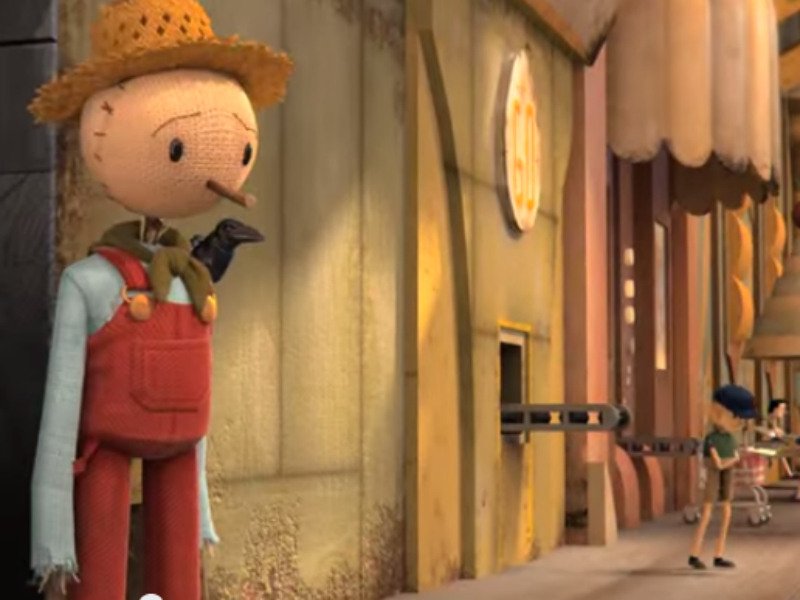Aarti Shah 20 Mar 2014 // 9:07PM GMT

Every marketing discipline is looking for a piece of brand storytelling. While PR firms and ad firms traditionally play in this space, increasingly, talent agencies are coming into the fold when the content marries brands with entertainment talent.
One successful example is talent behemoth CAA’s work with Chipotle on its “Cultivate a Better World” campaign that produced two of the more memorable pieces of branded content with “Back to the Start” and “The Scarecrow.” The "Back to the Start" video won the branded content category at Cannes Lions the first year the category was introduced.
While “Back to the Start” ultimately was shown in theatres and as a paid spot during the Grammys, its initial audience was garnered largely organically. Meanwhile, “The Scarecrow” had a modest ad buy, but primarily, it lived on Chipotle’s owned channels and garnered attention through an influencer campaign (handled by Edelman). What’s surprising is, branded content that's spreading organically or via paid is coming from talent agencies — a rival or partner that many PR firms perhaps haven’t yet considered.
CAA Marketing (a division of CAA) has been around since 1998 launching initially with Coca-Cola’s polar bear campaign and ultimately brokering the strategic deal between Coca-Cola and American Idol. The division now has 50 people across Los Angeles and New York, meanwhile rival United Talent Agency struck a joint venture deal in 2007 to launch the 30-person United Entertainment Group (UEG) that sits in Los Angeles, New York and Dallas. Now these marketing arms have grown from brokering deals to also producing brand content.
“We do large scale transactions but we also look to create bespoke content and respond to briefs in the same way an ad firm would,” says Todd Hunter, an executive at CAA Marketing, adding that because CAA doesn’t have a heritage steeped in a single marketing discipline, it takes a “pure” approach to briefs. “The media landscape has changed so much, so the question we ask is — what’s the best way to deliver that content?”
For example, he adds, the Chipotle campaign also included the creation of the Cultivate Festival that took place in Denver, San Francisco and Chicago last year.
Pointing to another example of blurring lines, UEG worked with AT&T to create content around its “It Can Wait” PSA against texting and driving to appeal to teens. UEG brought on touring musicians like Tim McGraw for spots that were shown in theatres last summer. The story here was personal: the musicians were on the roads touring and asking teenagers not to text and drive.
This leads to the question, is it be feasible for a communications firm to forge a partnership with a talent agency to help develop star-charged content? UEG president Adam Smith says its only formal partnership is with UTA. All other alliances are determined by the brand’s orbit of agencies.
“But we’re always looking for ways to create bigger opportunities for our clients — so who knows what the future holds?” Smith says.
That said, it’s not just talent agencies that are successfully creating entertaining content for brands. When entertainment PR/marketing shop BNC merged with PMK/HBH in 2009, they created PMK*BNC to be supercharged around the intersection of brands and entertainment.
For instance, last year the agency rolled out “The Challenge,” branded content for Audi featuring Star Trek veteran Leonard Nimoy and new star Zachary Quinto pitting Mercedes Benz against Audi. The spot, independent of the film franchise, garnered more than 8 million YouTube without a paid media component.
So what’s the advantage that entertainment agencies have when it comes to sophisticated, organic brand storytelling? The most obvious is access to talent. With the Chipotle videos, CAA was able to negotiate deals with Coldplay, Willie Nelson and Fiona Apple because of its massive network within entertainment. Meaning, CAA’s marketing team could not only dream the idea of having Willie Nelson cover Coldplay’s Scientist, they could execute on it. But for branded content to grow an audience mostly organically — does it need to have big name talent?
“Not necessarily,” says CAA’s Hunter. “So much of it comes down to execution. The power of talent can help, but it’s really all about the power of pop culture relevancy.”
Relevancy is why — at their core — PMK*BNC, CAA Marketing and UEG all position themselves as having a unique vantage into pop culture stemming from the work they do with entertainment. This involves knowing about things like cultural memes, breakout stars, and other entertainment hits before most everyone else. So far, there seems to enough room for all of these shops, but is the field becoming more crowded with consumer and generalist shops across marketing disciplines looking to make the same play?
“Every client uses their agency resources in different ways,” says PMK*BNC chairman/CEO Michael Nyman. “I do think we’re in a brave new world where we compete with talent agencies, we work with them and we represent them.”


































.jpg)




.tmb-135x100.jpg)












